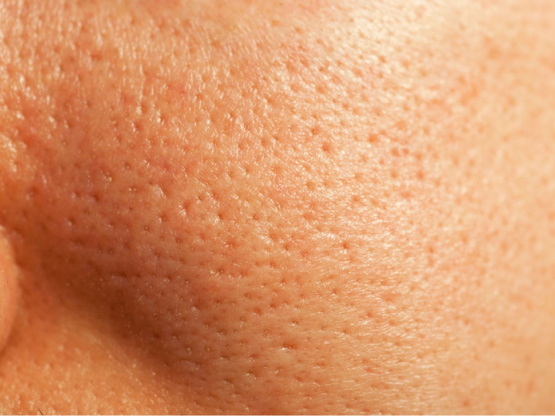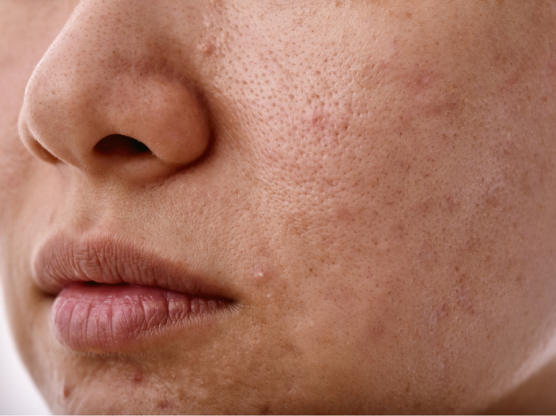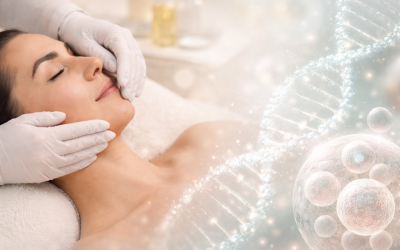

Textured skin is a term used to describe skin that appears rough, raised or uneven. Such skin feels bumpy and dry to touch, and is often used to describe skin with enlarged pores, blemishes, acne, as well as dry and/or mature skin.
CAUSES OF TEXTURED SKIN
Many factors can lead to textured skin. The most common ones are a build-up of dead skin cells, acne, dryness, aging, sun-exposure and certain skin conditions.
A Build-up of Dead Skin Cells
A build-up of dead skin cells leads to keratinised skin, which is dull, rough and bumpy. Such skin is often more prone to clogs and blemishes due to its tendency to trap impurities within the thickened skin layer.
Other causes that contribute to a build-up of dead skin cells include using the wrong moisturiser, or environmental changes that skin to lose hydration. A poor cleansing routine that does not properly remove makeup and excess oil can create a barrier, making it hard for the skin to shed old cells and create new ones.
Ageing
Our skin’s collagen and elastin network weakens as we age, resulting in skin sagging. This stretches out the pores – enlarging them. Cellular regeneration also weakens, so instead of skin renewal happening at a healthy 28-day cycle, skin can often take much longer to shed dead skin. This leads to skin keratinisation and gives an appearance of rougher, duller skin.
Acne
Acne is an inflammation of the skin – making it look uneven, rough and red. Persistent and severe acne can cause structural damage and leave the skin with pitted scars – causing skin texture to become uneven.
Dryness
Dry skin is more prone to keratin build-up, creating a barrier that traps dead skin cells that are ready to be shed.
Specific Skin Conditions
Specific skin conditions like eczema, rosacea or psoriasis can also cause rough, dry and uneven skin texture.
Sun Exposure
Too much sun-exposure can cause dehydrate and age the skin. This can cause skin to become dry and rough.
HOW TO IMPROVE TEXTURED SKIN
Ample Hydration
As can be seen from the above, dryness can cause a variety of skin problems, and is often a root cause of textured skin. Improving your skin’s moisture levels with a well-chosen skincare product and reducing causes of skin dehydration like sun-exposure can work well to improve the look of textured skin.
Regular Exfoliation
Regular exfoliation will reduce dead skin cell build-up and reveal the smoother, clearer skin underneath. Depending on your skin condition, you can opt to exfoliate once a week with a suitable exfoliator so as to help your skin stay on a healthy skin renewal cycle. Do note that too much exfoliation can also stress skin out and cause problems, so listen to your skin and never over-exfoliate.
Stimulate Cellular Turnover
This often goes hand-in-hand with exfoliation, since the shedding of dead skin cells will stimulate cell renewal and prompt the skin to create new skin cells. Using good skincare products that support this process will improve results.
Reduce Inflammation
Acne and sensitive skin types are plagued by inflammation and bumpy skin. Taking steps to reduce inflammation will reduce such conditions, resulting in calmer and smoother skin. Try to seek out the triggers that activate inflammation in your body. Dietary changes like reducing sugar, dairy, gluten and processed foods, and adhering to an anti-oxidant-rich diet high in vegetables and fruits will often help. Using good skincare that repairs the skin barrier and supports it with anti-inflammatory ingredients is also essential for keeping skin healthy and blemish-free.
Our Product Recommendation to Improve Textured Skin




